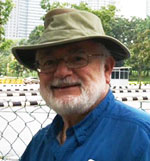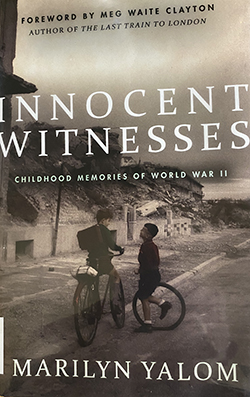Innocent Witnesses: Childhood Memories of World War II by Marilyn Yalom; Stanford: Stanford University Press; Redwood Press (c) 2021; 195 pages.
By Oliver B. Pollak, Ph.D.

 RICHMOND, California – Marilyn Yalom’s over eighteen books have been translated into several languages. Popular titles include A History of the Breast (1998), A History of the Wife (2001), and The American Resting Place: Four hundred years of history through our cemeteries and burial grounds (2008). Marilyn’s collaboration with her psychiatrist husband Irvin included a 2021 jointly authored book, A Matter of Death and Life, about her last year suffering from terminal multiple myeloma. She died in November 2019. Marilyn and Irvin met in middle school and had been married for 67 years. Her son Ben edited the manuscript. Irvin Yalom is the author of nine novels, eight nonfiction works and three films.
RICHMOND, California – Marilyn Yalom’s over eighteen books have been translated into several languages. Popular titles include A History of the Breast (1998), A History of the Wife (2001), and The American Resting Place: Four hundred years of history through our cemeteries and burial grounds (2008). Marilyn’s collaboration with her psychiatrist husband Irvin included a 2021 jointly authored book, A Matter of Death and Life, about her last year suffering from terminal multiple myeloma. She died in November 2019. Marilyn and Irvin met in middle school and had been married for 67 years. Her son Ben edited the manuscript. Irvin Yalom is the author of nine novels, eight nonfiction works and three films.
The Blitz started on September 7, 1940. German rockets terrorized London in 1944, the last exploded on March 27, 1945. As a child born in London in 1943, I have some unreliable memories of bomb shelters in the London Underground and giant gas filled balloons to thwart air raids. I was one year and five months old when the last explosion shook London. My mother and I were evacuated to the safety of Stoke on Trent. Perhaps these nightmarish scenes derive from family stories, reading, movies and imagination. My verifiable memory is of an empty lot around the corner from where we lived in Maida Vale with a deep hole in the ground, a victim of German rockets. There we celebrated with bonfires Guy Fawkes Day, the thwarting of the November 5, 1605 Gunpowder Plot. During the latter 1940s I recall cod liver oil and food rationing.
These memories engendered an interest in childhood memory. My son Noah Pollak and I presented “Children’s Memories and Literature – before, during and after Shoah,” at the Annual Scholar’s Conference on the Holocaust, in March 1999, at Nassau Community College, Garden City, N.Y. Our assessment of this proliferating genre included Anne Frank: The Diary of a Young Girl, works by Elie Wiesel and Jerzy Kosinski; Child of Our Time (1958) by Michel del Castillo; Empire of the Sun, A Novel (1984) by J. G. Ballard; and the ignominious Fragments: Memories of a Wartime Childhood (1996) by Binjamin Wilkomirski.
The six Innocents, born between 1926 and 1938, are Marilyn Yalom’s friends and colleagues. She was born Marilyn Koenick in Chicago in 1932. She majored in French at Wellesley College, spent a year abroad in France and graduated in 1954. She earned her MA in French and German at Harvard and Ph.D. in Comparative Literature from Johns Hopkins in 1963 writing her dissertation on Kafka and Camus. She met Irvin Yalom, stationed in the Army, in California. He got a position at Stanford Medical School, they married and settled in California. A feminist she belonged to Stanford’s Clayman Institute for Gender Research.
Yalom’s goal was “to understand the effects of…wartime experience on children living in Europe and the United States.” Her six friends provided intimate vignettes of terror, trauma, aerial bombing, bomb shelters, and hunger. They endured and became accomplished, but not unscarred, They are likely “the last individuals who can remember World War II” and they will soon “vanish.” She explored the concept of witnesses in her 2015 work, Compelled to Witness, Women Memoirs of the French Revolution.
Marilyn writes the first chapter from the perspective of a bystander. “A Sheltered Vision,” contains no deprivations and deracination associated with War. Her privilege of safety nurtured a sense of guilt and fostered empathy to tell untold stories. She recalled a festive Sunday dinner on December 7, 1941 and the news about Pearl Harbor coming from the four-foot high wooden radio. That week is the subject of a November 19, 2021 New York Times article, “The Decision That Cost Hitler the War,” by Benjamin Carter Hett who wrote “The world probably changed more between Dec. 5 and Dec. 12, 1941, had in any other week in history,” while reviewing Hitler’s American Gamble, Pearl Harbor and Germany’s March to Global War (2021) by Brendan Simms and Charlie Laderman.
“Within the War Machine” by Winfried Weiss is based on his 1983 book A Nazi Childhood. He was born in 1936. The son of a Nazi policeman he was raised to praise Hitler, the SS and the invincible German military. His father never returned from the front. When the victorious Americans marched through his town Winfried made a 180 degree turn and supported the Allies 100 percent. He emigrated to America in 1956. His partner pianist Robert Hagopian died of AIDS in 1984, Winfried followed in 1991.
Susan Groag Bell is the oldest witness, born in 1926 in Sudetenland, Czechoslovakia. The family’s conversion to Lutheranism offered no protection from anti-Semitism. When Hitler annexed Sudetenland in 1939 she and her mother fled to England. Her father stayed in Czechoslovakia and died in Theresienstadt (I wonder if my physician grandfather, interned at the same camp, signed his death certificate). Bell was denied entrance to the Stanford Ph.D History program because she was too old. She became a productive independent scholar associated with Stanford’s Clayman Institute for Gender Research. She published Between Worlds: In Czechoslovakia, England and America in 1991. Like Marilyn most of Bell’s work concentrated on women’s history. Susan and Marilyn co-edited Revealing Lives: Autobiography, Biography, and Gender in 1990. Marilyn and Susan first met in 1976. Susan died in 2015.
There are harrowing accounts of fear, dystopia and resilience. Stina Katchadourian, a Finn in Lapland and Sweden was caught between two enemies, the Soviet Union and Germany. Philippe Martial born in Indochina in 1934, raised in Djibouti in French Somaliland, went to Normandy and then fled with his mother from German occupied France to the “Free Zone.” His physician father died of paratyphoid shortly before the war. The repressed memories of Hungarian teenager Robert “Bob” Berger, passing as Christian in the resistance were only exposed in 2011, triggered by a threat to his life. He became a preeminent surgeon. He graduated from medical school in the same class as the author’s husband. Robert died in 2016.
Four Witnesses recalled the role of reading, books and libraries; they became authors. The Nazi’s perpetrated book burnings; the survivors through their writings will not be forgotten. Marilyn Yalom recalls that on December 7, 1941, she was reading one of the three books she checked out every week from the Petworth Library. The mother of one witness, an omnivorous reader, distressed over the lack of books available in France. Another mother salvaged about 20 books of history and biography, “the mutilated remains of the family library.” Another witness reported that in Rovaniemi, Finland, “There was a German officer’s club, a German bakery, a bookshop and a library.”
The Witnesses, three women and three men, Catholics, Lutherans and Jews, had more than their share of poor health, mental illness, depression, and tuberculosis linked to their turbulent childhood, war and missing paternal years. This book was conceived in Paris. A “fledgling friendship” between Marilyn, and Witnesses Philippe Martial, an authority on the French Senate, and Alain Briottet, French Consul General in Boston and Ambassador to Burma, Finland, and Bangladesh, resulted in these essays on childhood experiences.
The book has a Foreword, Preface, Epilogue, Afterword and Acknowledgments, each revealing bits of pertinent personal information. Four of the six Witnesses have died. The ranks of Holocaust Survivors and veterans are thinning. This timely and valuable book examines diverse vital stories and the vagaries of childhood memory reported at a substantially later age. This is an important imaginative exploration of our shared past.
*
Oliver B. Pollak, Ph.D, a professor emeritus of history at the University of Nebraska Omaha, and a lawyer, is a correspondent now based in Richmond, California.